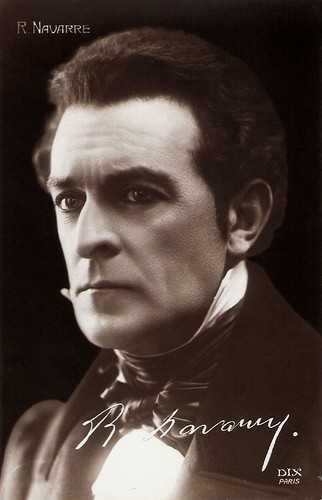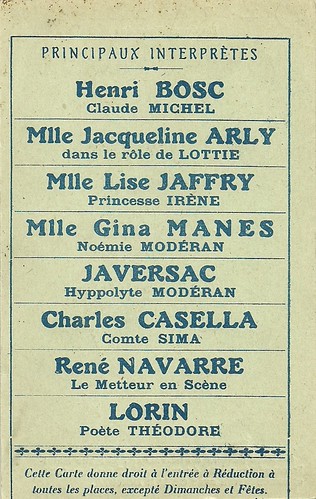René Navarre (1877-1968) was a star of the French silent cinema. He appeared in 109 films between 1910 and 1946. Navarre is best remembered as the mysterious master criminal Fantômas in the legendary serial by Louis Feuillade.

French postcard. Photo: DIX, Paris.

French postcard by Cinémagazine, no. 109.
Victor René Navarre was born in Limoges in 1877. At 16, he debuted on stage at the Théâtre de Montmartre in Victorien Sardou’s play 'Patrie' (Homeland). For 15 years he would perform everywhere, in Paris and all over the country.
In late 1909, he started to work for the Gaumont film company. Navarre became part of the regular cast of Gaumont dramas and comedies, directed by Albert Capellani, Georges Denola, Etienne Arnaud, Michel Carré, Georges-André Lacroix, Henri Fescourt, Léonce Perret, and above all, Louis Feuillade.
He often performed next to child star Clement Mary, the future René Dary, in Feuillade’s series of Bébé. He also played detective Jean Dervieux in Le proscrit/The Outlaw (Louis Feuillade, 1912) and various other shorts in 1912-1913.
Feuillade immortalised Navarre by offering him the role of the master criminal in Fantômas (Louis Feuillade, 1913-1914), a serial based on the dime novels by Marcel Allain. This enormously popular serial had five episodes: Fantômas – A’ l’ombre de la guillotine/Fantômas - In the Shadow of the Guillotine, Juve contre Fantômas/Juve Against Fantômas, Le mort qui tue/The Dead Man Who Killed, Fantômas contre Fantômas/Fantômas Against Fantômas, and Le faux magistrat/The False Magistrate.
The story of Fantômas's exploits and adventures is also the story of the woman he loves and of the men trying to catch him. In a time when films still used novelty to draw crowds these shorts entertained audiences with exhilarating escapes, astounding disguises, and taboo violence. Next to Fantômas and the head of police Juve (Edmund Breon), there were three supporting characters, the journalist Jerome Fandor (Georges Melchior), Fantomas’ mistress Lady Beltham (Renée Carl) and princess Danidoff (Jane Faber) who returned in almost every episode.

Spanish mini-card (collector card) by Reclam Films, Mallorca. Photo: Gaumont. René Navarre as Fantomas in a scene from the serial Fantomas, second series, Juve versus Fantômas/Juve contre Fantômas (Louis Feuillade, 1913), card no. 6. Fantomas aka The Man in Black dynamites the villa in which Juve and Fandor are.

Spanish mini-card (collector card) by Reclam Films, Mallorca. Photo: Gaumont. Renée Carl as Lady Beltham and René Navarre as Fantomas in Fantômas contre Fantômas (Louis Feuillade, 1914), the fourth episode of the serial Fantomas, card 6 of 6. At Lady Beltham's villa, Fantomas demands the money collected in the charity ball subscription.
When the Great War broke out, René Navarre was conscripted, interrupting the Fantomas series. He could return to the studios in 1915, having become a star.
He first did Le grand souffle/The Great Breath for Gaston Ravel and then decided to found his own production company, Films-René-Navarre, and to direct his own films.
In 1916 he co-directed with Gérard Bourgois Christophe Colomb/Christopher Columbus, starring Georges Wague and Jean Garat. The following year he produced four animation films by Emile Cohl and Benjamin Rabier but after a quarrel with Cohl, the series was interrupted.
In September 1919 Navarre founded the company Société des Cinéromans, which until 1922 produced eight prestigious productions based on scripts by Gaston Leroux and Arthur Bernède, such as Tue-la-mort/Kill the Dead Man (René Navarre, 1920) with Navarre in the title role, Jacqueline Arly and Madeleine Aile, L’aiglonne (René Navarre, Emile Keppens, 1921) with Cyprian Gilles and Suzy Prim, Vidocq (Jean Kemm, 1923) with Navarre in the title role, Jean Chouan (Luitz-Morat, 1925) with Navarre and Maurice Schutz in the title role, and the serial Belphégor/The Phantasm of the Louvre (Henri Desfontaines, 1927).
In 1920, producer Serge Sandberg appointed him manager of the Studios de la Victorine in Nice. He also continued with his Films René Navarre and produced Ferragus (Gaston Ravel, 1923) in which he had the title role, next to Stewart Rome.


French postcard (both sides). Photos: Société des Cinéromans. René Navarre, Gina Manès and many others in the French silent film Le 7 de trèfle/Le sept de trèfle (1921), directed by René Navarre. The film was scripted by Gaston Leroux (The Phantom of the Opera). It was a serial with 12 episodes, released in France on 16 September 1921. This card promotes its screening at the Toulouse-based cinema Olympia, 13, rue St Bernard. It still exists as Cinema ABC.

French postcard for Production Charles Le Fraper, Paris. Photo: L. Pierson. Publicity still for Judex (Maurice Champreux, 1934).
The arrival of sound film drastically cut René Navarre’s career short. His performance was considered too theatrical.
He had to be satisfied with minor parts, as in Jean Gabin’s debut Mephisto (Henri Debain, Georges Vinter, 1930). He also played supporting parts in a sound version of Fantômas (Paul Féjos, 1932), and that of Judex (Maurice Champreux, 1933).
In 1937 Léon Mathot gave him the role of Monsieur Charles in Chéri-Bibi (Léon Mathot, 1938), in which Pierre Fresnay played the title role. Other small parts Navarre played were in La route enchantée/The Enchanted Road (Pierre Caron, 1938) with Charles Trenet, and in Brazza ou l’épopée du Congo/Brazza of the Epic of the Congo (Léon Poirier, 1939).
After a last performance in Les surprises de la radio/The Surprises of the Radio (Marcel Aboulker, 1940), he quit the screen altogether. René Navarre was married to the actress Nelly Palmer and subsequently to Elmire Vautier. He had with both actresses a child. Nelly Palmer prematurely died in 1916. The marriage to Vautier ended in a divorce.
In 1968, the man who as Fantômas had frightened millions, died forgotten in Azay-sur-Cher, France. René Navarre was 90.
Scenes from Erreur tragique/Tragic Error (Louis Feuillade, 1913) with Suzanne Grandais and René Navarre. Music: Patrick Laviosa. Source: tonytony9292 (YouTube).
DVD Trailer of Fantômas (1913-1914). Source: Kino International / Kino Classics (YouTube).
Sources: Philippe Pelletier (CinéArtistes - French), Wikipedia and IMDb.
This post was last updated on 7 April 2025. With thanks to Marlène Pilaete.

French postcard. Photo: DIX, Paris.
French postcard by Cinémagazine, no. 109.
Master criminal
Victor René Navarre was born in Limoges in 1877. At 16, he debuted on stage at the Théâtre de Montmartre in Victorien Sardou’s play 'Patrie' (Homeland). For 15 years he would perform everywhere, in Paris and all over the country.
In late 1909, he started to work for the Gaumont film company. Navarre became part of the regular cast of Gaumont dramas and comedies, directed by Albert Capellani, Georges Denola, Etienne Arnaud, Michel Carré, Georges-André Lacroix, Henri Fescourt, Léonce Perret, and above all, Louis Feuillade.
He often performed next to child star Clement Mary, the future René Dary, in Feuillade’s series of Bébé. He also played detective Jean Dervieux in Le proscrit/The Outlaw (Louis Feuillade, 1912) and various other shorts in 1912-1913.
Feuillade immortalised Navarre by offering him the role of the master criminal in Fantômas (Louis Feuillade, 1913-1914), a serial based on the dime novels by Marcel Allain. This enormously popular serial had five episodes: Fantômas – A’ l’ombre de la guillotine/Fantômas - In the Shadow of the Guillotine, Juve contre Fantômas/Juve Against Fantômas, Le mort qui tue/The Dead Man Who Killed, Fantômas contre Fantômas/Fantômas Against Fantômas, and Le faux magistrat/The False Magistrate.
The story of Fantômas's exploits and adventures is also the story of the woman he loves and of the men trying to catch him. In a time when films still used novelty to draw crowds these shorts entertained audiences with exhilarating escapes, astounding disguises, and taboo violence. Next to Fantômas and the head of police Juve (Edmund Breon), there were three supporting characters, the journalist Jerome Fandor (Georges Melchior), Fantomas’ mistress Lady Beltham (Renée Carl) and princess Danidoff (Jane Faber) who returned in almost every episode.

Spanish mini-card (collector card) by Reclam Films, Mallorca. Photo: Gaumont. René Navarre as Fantomas in a scene from the serial Fantomas, second series, Juve versus Fantômas/Juve contre Fantômas (Louis Feuillade, 1913), card no. 6. Fantomas aka The Man in Black dynamites the villa in which Juve and Fandor are.

Spanish mini-card (collector card) by Reclam Films, Mallorca. Photo: Gaumont. Renée Carl as Lady Beltham and René Navarre as Fantomas in Fantômas contre Fantômas (Louis Feuillade, 1914), the fourth episode of the serial Fantomas, card 6 of 6. At Lady Beltham's villa, Fantomas demands the money collected in the charity ball subscription.
Vidocq
When the Great War broke out, René Navarre was conscripted, interrupting the Fantomas series. He could return to the studios in 1915, having become a star.
He first did Le grand souffle/The Great Breath for Gaston Ravel and then decided to found his own production company, Films-René-Navarre, and to direct his own films.
In 1916 he co-directed with Gérard Bourgois Christophe Colomb/Christopher Columbus, starring Georges Wague and Jean Garat. The following year he produced four animation films by Emile Cohl and Benjamin Rabier but after a quarrel with Cohl, the series was interrupted.
In September 1919 Navarre founded the company Société des Cinéromans, which until 1922 produced eight prestigious productions based on scripts by Gaston Leroux and Arthur Bernède, such as Tue-la-mort/Kill the Dead Man (René Navarre, 1920) with Navarre in the title role, Jacqueline Arly and Madeleine Aile, L’aiglonne (René Navarre, Emile Keppens, 1921) with Cyprian Gilles and Suzy Prim, Vidocq (Jean Kemm, 1923) with Navarre in the title role, Jean Chouan (Luitz-Morat, 1925) with Navarre and Maurice Schutz in the title role, and the serial Belphégor/The Phantasm of the Louvre (Henri Desfontaines, 1927).
In 1920, producer Serge Sandberg appointed him manager of the Studios de la Victorine in Nice. He also continued with his Films René Navarre and produced Ferragus (Gaston Ravel, 1923) in which he had the title role, next to Stewart Rome.


French postcard (both sides). Photos: Société des Cinéromans. René Navarre, Gina Manès and many others in the French silent film Le 7 de trèfle/Le sept de trèfle (1921), directed by René Navarre. The film was scripted by Gaston Leroux (The Phantom of the Opera). It was a serial with 12 episodes, released in France on 16 September 1921. This card promotes its screening at the Toulouse-based cinema Olympia, 13, rue St Bernard. It still exists as Cinema ABC.
French postcard for Production Charles Le Fraper, Paris. Photo: L. Pierson. Publicity still for Judex (Maurice Champreux, 1934).
Forgotten
The arrival of sound film drastically cut René Navarre’s career short. His performance was considered too theatrical.
He had to be satisfied with minor parts, as in Jean Gabin’s debut Mephisto (Henri Debain, Georges Vinter, 1930). He also played supporting parts in a sound version of Fantômas (Paul Féjos, 1932), and that of Judex (Maurice Champreux, 1933).
In 1937 Léon Mathot gave him the role of Monsieur Charles in Chéri-Bibi (Léon Mathot, 1938), in which Pierre Fresnay played the title role. Other small parts Navarre played were in La route enchantée/The Enchanted Road (Pierre Caron, 1938) with Charles Trenet, and in Brazza ou l’épopée du Congo/Brazza of the Epic of the Congo (Léon Poirier, 1939).
After a last performance in Les surprises de la radio/The Surprises of the Radio (Marcel Aboulker, 1940), he quit the screen altogether. René Navarre was married to the actress Nelly Palmer and subsequently to Elmire Vautier. He had with both actresses a child. Nelly Palmer prematurely died in 1916. The marriage to Vautier ended in a divorce.
In 1968, the man who as Fantômas had frightened millions, died forgotten in Azay-sur-Cher, France. René Navarre was 90.
Scenes from Erreur tragique/Tragic Error (Louis Feuillade, 1913) with Suzanne Grandais and René Navarre. Music: Patrick Laviosa. Source: tonytony9292 (YouTube).
DVD Trailer of Fantômas (1913-1914). Source: Kino International / Kino Classics (YouTube).
Sources: Philippe Pelletier (CinéArtistes - French), Wikipedia and IMDb.
This post was last updated on 7 April 2025. With thanks to Marlène Pilaete.
No comments:
Post a Comment